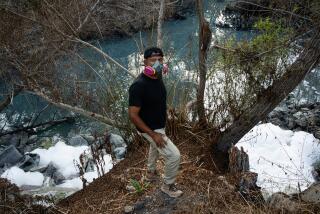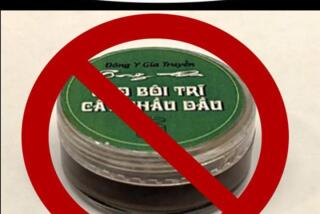Tainted Tea from Mexico Almost Kills S.D. Woman, Doctors Say
- Share via
After a San Diego woman nearly died, UC San Diego Medical Center officials warned Thursday that a popular brand of tea sold in Mexico may contain a life-threatening poison.
The tea, Lagg’s Te de Jamaica, sold at markets throughout Baja California, was found to contain warfarin, an anti-coagulant used in rat poison, said Dr. William A. Norcross, a family medicine doctor at UCSD.
The poison was found only in the one package, and the tea is not sold in the United States.
Warfarin, which is tasteless and odorless, can be nearly fatal in doses as small as a few specks on a table, Norcross said.
The drug, which also is used for therapeutic purposes, is designed to prevent blood from clotting. When used as a poison it can cause a rat to bleed to death, he said.
How the poison got into a box of tea is a mystery to Norcross and to Catherine Martiarena, who doctors said nearly died after she drank tea bought from a supermarket in Tijuana.
Martiarena, 41, said she is a “habitual tea drinker” who prefers the teas her husband brings back from his trips to Mexico.
She said she was looking for a tea in January that would help her recover from routine surgery. She chose Lagg’s Te de Jamaica, a hibiscus tea, for its diuretic effects, she said.
Instead of recovery, however, she began to feel the effects of the poison.
Suffering from fatigue and headaches in mid-January, Martiarena went to Dr. Lee Ralph, who diagnosed warfarin poisoning, Norcross said.
“She was anemic, had bruises and probably internal bleeding as well,” Norcross said.
She was immediately admitted to the hospital, where large doses of Vitamin K helped her liver regain its blood-clotting abilities, Norcross said.
In the days that followed her recovery, doctors, police and Martiarena worked to find out what had poisoned her, she said. For days she had to watch everything she ate, since the poison could only have entered her body orally, she said.
Martiarena and a friend finally narrowed it down to her teas, she said.
Doctors told her to brew them as usual and bring them in for toxicology tests.
Five months later, the experts confirmed the presence of warfarin metabolytes in the tea, Norcross said.
Martiarena had been drinking the poisonous tea for days or even weeks.
“She could have easily ruptured a blood vessel in her brain or cut herself and bled to death,” Norcross said.
Norcross called the San Diego County Public Health Department to warn them of the tea’s dangers. They in turn notified the state and federal Food and Drug Administration, said Paula Tanner, a supervisor in the county’s environmental health department.
“I’m concerned with Mexico. . . . They should look at the manufacturing plant,” Tanner said. “In the United States (the one instance of poisoning) would require a visit to try to determine what happened.”
The tea, packaged in a fuchsia box with a yellow stripe, remains on the shelves in Mexican markets.
“Since the product was purchased privately in Mexico, we can’t follow up on it. We have no jurisdiction in foreign entities,” said Rosario Vior, a spokesman for the FDA.
With the American agencies unable to mount a full-blown investigation, the officials at UCSD felt it best to caution would-be tea buyers, especially during a holiday weekend, Norcross said.
“The bottom line is that other countries may not have the rigorous standards and regulations that we have. You are taking a risk when buying food there,” Norcross said.
More to Read
Sign up for Essential California
The most important California stories and recommendations in your inbox every morning.
You may occasionally receive promotional content from the Los Angeles Times.












